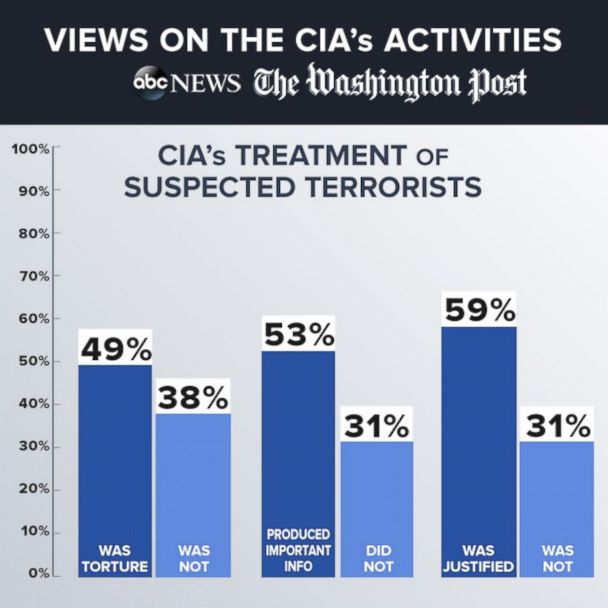Six in 10 See CIA Actions as Justified As Many Question Committee Report

(ABC News)
Six in 10 Americans say the CIA's treatment of suspected terrorists was justified, more than half think it produced important, unique intelligence - and 52 percent say it was wrong for the Senate Intelligence Committee to issue a report suggesting otherwise.
Those results in a new ABC News/Washington Post poll underscore the public's sense of risk from the threat of terrorism, and specifically the extent to which majorities support controversial measures to combat it. Indeed just two in 10 flatly rule out torture in future cases.
See PDF with full results, charts and tables here.
A plurality, 49 percent, believes the CIA did in fact torture suspected terrorists; 38 percent think its actions did not amount to torture, with the rest unsure. Regardless, the public by a broad 59-31 percent also says the agency's interrogation actions were justified.
One reason is that 53 percent think these interrogations produced important information that could not have been obtained any other way. Just 31 percent reject this claim, a focus of the recent debate.
CIA Torture Report: The Most Stunning Findings
Torture Report: Former CIA Directors Say Interrogation Program 'Saved Thousands of Lives'
CIA Torture Report: Why It Didn't Help in the Hunt for Osama Bin Laden
It's a critical point: Among those who think the CIA interrogations produced unique information, 85 percent say its treatment of suspected terrorists was justified. That drops precipitously, to 28 percent, among those who say the approach did not produce important information.
Other results in this poll, produced for ABC by Langer Research Associates, show substantial misgivings about the Senate committee's report:
- Americans by an 11-point margin, 47-36 percent, are more apt to see it as unfair rather than fair in its description of what occurred.
- The public by 52-43 percent feels more that it was wrong to release the report because it may raise the risk of terrorism by stirring anti-American sentiment - as critics say - than right to release the report in order to expose what happened and prevent a recurrence.
- Additionally, Americans by 57-34 percent oppose criminal charges against officials who were responsible for the agency's interrogation activities.
A majority does accept one of the committee's key criticisms: Fifty-four percent think the CIA did in fact mislead the White House, Congress and the public about its activities. At the same time, four in 10 of them also say the agency was justified in doing so. A net total of just 33 percent think both that the CIA misled, and did so without justification.
Another result also indicates a source of support for the CIA: the fact that, looking ahead, most Americans are unwilling to rule out torture of suspected terrorists. Fifty-eight percent say it can sometimes or even often be justified. Nineteen percent say it can be justified, albeit just rarely, while 20 percent rule it out entirely.
DOES IT WORK? - Many views on the issue are informed by judgments of whether the agency's interrogation techniques in fact work. It's a key point because past research also has shown the extent to which many Americans, in a time of threat, place a priority on security over other rights.
As noted, people who think these interrogations produced unique intelligence are far more likely than others to see the CIA's actions as justified. They're also far more apt to think future torture can be justified, to oppose criminal charges and to oppose the release of the committee report.
Views of whether or not the CIA's actions produced important information, in turn, are influenced to some extent by political and partisan predispositions. Seventy percent of Republicans and 68 percent of conservatives think important information was gained. So do smaller majorities of independents and moderates, 53 and 51 percent, respectively. Among Democrats and liberals, 40 and 35 percent, respectively, think useful information resulted.
GROUPS - There are similar divisions on other issues. At the high end of support for the agency, 82 percent of conservative Republicans say the CIA's actions were justified - and just 30 percent think the interrogation techniques amounted to torture. Across the political and ideological spectrum, among liberal Democrats, 38 percent think the CIA actions were justified, and 73 percent see them as torture. There also are large partisan and ideological gaps in views of the committee's report.
Among other groups, seeing the CIA's actions as justified rises with age (from 50 percent among under 30s to 66 percent of seniors), declines with education, and is nearly 20 percentage points higher among whites than nonwhites. More-educated adults are much more apt than those with less education to classify the CIA's activities as torture.
Criminal charges, for their part, are supported by two-thirds of those who think the CIA misled the White House, Congress and public without justification; two-thirds of those who think the treatment of prisoners was unjustified; and six in 10 of those who think the actions did not produce important information. But those are minorities in each case - and by contrast, even among those who see the actions as torture, fewer than half support bringing charges against those responsible.
METHODOLOGY - This ABC News/Washington Post poll was conducted by telephone Dec. 11-14, 2014, in English and Spanish, among a random national sample of 1,000 adults, including landline and cell-phone-only respondents. Results have a margin of sampling error of 3.5 points, including design effect.
The survey was produced for ABC News by Langer Research Associates of New York, N.Y., with sampling, data collection and tabulation by Abt-SRBI of New York, N.Y.